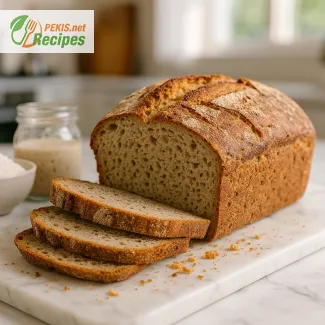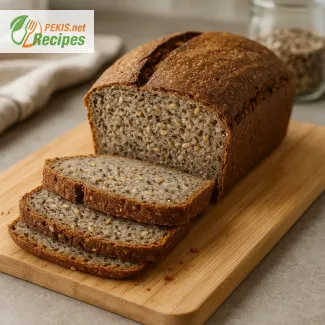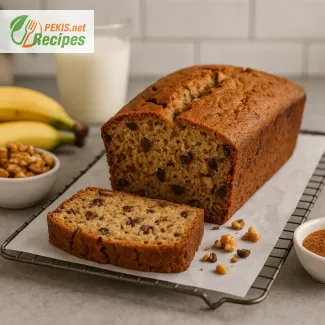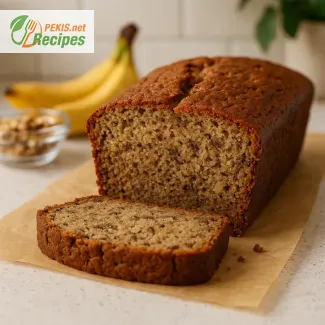A warm slice of Gluten-Free Christmas Bread brings a tender, buttery crumb filled with raisins, candied orange peel and festive spices. Inspired by old European holiday loaves, it stays soft and delicately sweet, with a golden crust that gently cracks under the knife. Every bite feels nostalgic, comforting and perfect for sharing during cozy winter mornings.
A small trick makes this gluten-free Christmas bread stay soft longer: balancing moisture with just enough fat so the crumb stays tender even the next day. Working with enriched doughs has shown how much warmth, resting time and gentle handling shape the final texture. PEKIS – a professional chef and recipe developer with over 25 years of experience in cooking and baking, specializing in European and international cuisine.
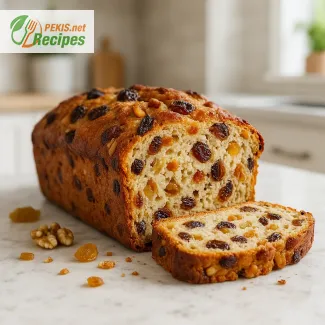
Cozy Gluten-Free Christmas Loaf for Warm Holiday Gatherings
Soft festive bread with spices, citrus and dried fruit you can share with everyone
The first slice of gluten-free Christmas bread still feels a little warm in your hands, the soft crumb giving way under the knife and releasing the scent of butter, orange zest and gentle spices. Sugar on the crust catches the light, the interior is moist, tender and slightly chewy, dotted with juicy raisins, candied peel and crunchy nuts. It is the kind of bread that lands on the table in the middle of a noisy December afternoon and suddenly quiets the room as everyone reaches for a slice at once.
Instead of dense, dry or crumbly texture that often comes to mind with gluten-free baking, this festive loaf focuses on a delicate, elastic crumb that holds together when cut, yet stays pillowy and light when you tear off a piece by hand. A carefully balanced gluten-free flour blend, enriched with eggs, fat and milk, gives structure; long rising time and gentle handling let the dough develop flavor without collapsing. Sweetness is layered, not aggressive: a mix of sugar or honey, dried fruit and a hint of vanilla makes the bread feel indulgent, but still appropriate for breakfast, brunch or an evening cup of tea.
A closer look at the texture and flavor
At the heart of this gluten-free bread is the contrast between the tender interior and a thin, lightly golden crust. The dough is enriched, almost like a light brioche, so every slice feels buttery and rich but never heavy. Warm spices such as cinnamon, cardamom, nutmeg or allspice add a slow, aromatic warmth rather than a sharp kick, while citrus zest brightens each bite and keeps the overall flavor from feeling flat.
Because there is no gluten to create natural elasticity, the texture depends on precise hydration and the right balance between starches and wholegrain elements. Too much starch and the loaf becomes gummy; too much whole flour and it dries out. The sweet add-ins are not just decoration: raisins, cranberries, chopped apricots or candied orange peel bring pockets of juiciness that keep the bread soft for longer, while almonds, hazelnuts or walnuts give occasional crunch and a deep, nutty aroma.
Gluten-free Christmas bread with dried fruit, nuts and warm spices
Each ingredient in gluten-free Christmas bread has a specific job. The flour blend provides structure; a mix of lighter starches and slightly heavier flours (such as rice or buckwheat) prevents the loaf from collapsing while still staying light. Yeast adds lift and subtle tang, while a touch of sugar feeds the yeast and sweetens the dough. Eggs bind everything together and contribute to that yellow, custard-like crumb, and butter or plant-based fat keeps the loaf tender even after a day or two.
The festive character comes from the extras: citrus zest, vanilla, spices and dried fruit turn a simple loaf into a centerpiece for holiday breakfasts or Christmas afternoon coffee. If you are baking for guests who also watch their sugar intake, you can keep the sweetness moderate and serve a richer dessert on the side, like the Diabetic-friendly almond flour chocolate cake recipe with no sugar, so everyone at the table finds something that suits them.
Why you’ll love this gluten-free Christmas bread
- Inclusive festive baking – everyone, including those who avoid gluten, gets to enjoy the same beautiful Christmas loaf.
- Soft, non-crumbly texture – the moist, delicate crumb slices cleanly and holds together on the plate.
- Balanced sweetness – just enough natural sweetness from dried fruit and sugar without overwhelming the spices.
- Rich holiday aroma – layers of cinnamon, citrus, vanilla and butter create that unmistakable Christmas bakery smell at home.
- Versatile serving options – perfect plain, lightly toasted, buttered or served with jam, honey or soft cheese.
Origin and tradition behind Christmas bread
Holiday breads with dried fruit and spices appear in many European traditions: Stollen, panettone, potica, sweet braided loaves and nut-filled rolls all share the idea of celebrating the season with enriched dough. A modern gluten-free Christmas bread takes this heritage and adapts it, keeping the festive aromas and symbolism of abundance while making the crumb suitable for those who cannot tolerate wheat.
In some homes, this loaf replaces the classic fruitcake; in others, it sits next to it, offering a wheat-free alternative that still feels traditional. The use of nuts and warm spices echoes other beloved festive bakes. If you enjoy rich, rolled nut breads, the Perfect Christmas Potica Recipe Tips for Soft and Nutty Perfection shows another way to bring nuts, spices and sweet dough to the holiday table.
Storage and make-ahead tips for gluten-free Christmas bread
Gluten-free bakes can dry out faster, so a few simple habits make a big difference:
- Let the loaf cool completely before wrapping to avoid condensation and soggy crust.
- Store slices in an airtight container or tightly wrapped at room temperature for short-term keeping.
- For longer storage, freeze individual slices, then reheat gently in the oven or toaster for a freshly baked feel.
- If the bread feels slightly dry after a day or two, a quick toast and a little butter, jam or honey restore its softness and aroma.
Preparing the dough ahead is also possible: shape the loaf, let it rise partially in the fridge overnight and bake it fresh in the morning, filling the kitchen with warm, spicy Christmas fragrance just as everyone wakes up.
Creative variations and serving ideas
- Add orange or lemon glaze on top for extra shine and citrus punch.
- Fold in dark chocolate chips or chunks along with dried fruit for a richer, dessert-like version.
- Swap part of the dried fruit for dried cherries, cranberries or figs to vary sweetness and texture.
- Use toasted almonds, hazelnuts or pecans for deeper nutty notes and extra crunch.
- Shape the dough into a wreath, braided loaf or small individual rolls to match different holiday table settings.
With a thoughtful balance of gluten-free structure, festive flavors and flexible serving options, this Christmas bread becomes a reliable centerpiece you can return to each year and easily adapt to the tastes of your guests.
- Warm the milk until lukewarm (about 38 °C / 100 °F). Whisk in yeast and 1 tablespoon of sugar. Let stand for 10 minutes until foamy.
- In a large bowl combine the gluten-free flour blend, remaining sugar, salt, cinnamon and nutmeg. Mix well to distribute the spices.
- Add eggs, melted butter, vanilla extract, and the activated yeast mixture. Stir with a spatula, then knead gently until a smooth, slightly sticky dough forms.
- Fold in raisins, candied orange peel and chopped almonds. Mix until evenly distributed without crushing the fruit.
- Cover the bowl and let the dough rise for 60–75 minutes in a warm place until noticeably puffy.
- Lightly oil a loaf pan (approx. 22–24 cm / 9–10 inch). Transfer the dough and smooth the top with damp hands.
- Cover and let rise a second time for 30–40 minutes until the dough reaches near the top of the pan.
- Preheat the oven to 175 °C (347 °F). Brush the top of the loaf with milk for an even golden crust.
- Bake for 40–45 minutes until the surface is golden brown and the center reaches a firm, springy texture.
- Cool in the pan for 10 minutes, then transfer to a rack. Dust with powdered sugar once fully cooled.
FAQ questionHow do you keep gluten-free Christmas bread from turning dry and crumbly?
Gluten-free dough lacks the natural elasticity of wheat, so it needs enough moisture and fat to stay soft. Using warm milk, eggs and melted butter enriches the crumb, while a well-balanced gluten-free flour blend prevents a sandy texture. Letting the dough rise fully and avoiding too much extra flour during shaping also helps. Once baked, cool the loaf completely and store it airtight; for longer keeping, freeze slices and reheat gently so the bread tastes freshly baked.
FAQ questionWhich gluten-free flour blend works best for festive Christmas bread?
A good blend combines light starches (such as rice or corn starch) with slightly heavier flours (like rice or buckwheat) for structure. Too much starch makes the bread gummy, while too much wholegrain can dry it out. Look for blends designed specifically for yeasted breads, not just cakes, because they usually include binders that mimic gluten. The goal is a soft, elastic crumb that holds dried fruit and nuts without collapsing
FAQ questionCan gluten-free Christmas bread rise as well as regular festive bread?
Yes, with the right method. The yeast needs lukewarm liquid and a bit of sugar to activate properly, creating enough gas to lift the dough. A gluten-free dough will be softer and stickier than wheat dough, but it should still hold its shape in the pan. Allow enough time for the first and second rise, and do not rush this step. Proper proofing, combined with a well-heated oven, gives a nicely domed loaf with a light, tender texture instead of a dense block.
FAQ questionHow can you add more flavor to gluten-free Christmas bread without making it heavy?
Flavor comes from spices, citrus and good-quality add-ins instead of just extra fat or sugar. Grated orange or lemon zest, cinnamon, nutmeg, cardamom and a touch of vanilla build a complex festive aroma. Adding raisins, cranberries, candied orange peel and chopped nuts gives bursts of sweetness and texture. These ingredients enrich the bread without weighing down the crumb, so every slice feels aromatic, balanced and pleasantly indulgent.
FAQ questionIs gluten-free Christmas bread suitable for guests with multiple dietary needs?
The basic recipe already avoids gluten, which helps many guests, but it can also be adapted further. Dairy can be swapped for plant-based milk and fat, and nuts can be replaced with seeds or omitted if necessary. For those watching sugar, the sweetness can be reduced and paired with a lighter dessert on the side. With a few thoughtful swaps, the loaf becomes an inclusive centerpiece, so people with different dietary needs can still enjoy a festive slice together.
FAQ questionWhat is the best way to serve gluten-free Christmas bread during the holidays?
This bread is delicious plain and slightly warm, but it also shines with simple additions. Serve slices lightly toasted with butter, honey or jam for breakfast, or pair them with soft cheese and fruit for a cozy evening snack. The delicate crumb and thin golden crust make it easy to cut into neat slices for a buffet. Because the flavor is gently spiced rather than overpowering, the bread fits naturally into brunch tables, afternoon coffee spreads and Christmas morning breakfasts.
A warm loaf of gluten-free Christmas bread on the table sends a clear message: everyone is invited. The soft, tender crumb, the golden crust and the aroma of spices, citrus and dried fruit create that familiar festive feeling without excluding anyone who avoids gluten. It looks like a classic holiday bake, slices like it and feels just as generous.
Working with a carefully balanced gluten-free flour blend, enriched with eggs, milk and butter, turns what could be a dense loaf into a light, moist and stable bread that holds its shape. The dough supports plenty of raisins, candied peel and nuts, so every bite offers contrast between chewy fruit, gentle sweetness and subtle crunch. Thoughtful hydration and proper rising time do the rest, giving a structure that stays pleasant even the next day.
Small choices make this festive loaf adaptable to different needs. Adjusting sweetness, switching to plant-based milk or fat, or omitting nuts when necessary keeps the profile inclusive while preserving its Christmas character. Whether served at breakfast, as an afternoon treat or alongside other desserts, it quietly anchors the table with comfort, warmth and tradition.
Once the method feels familiar, the dough becomes a base for variation: different dried fruits, extra citrus, a drizzle of glaze or even small rolls instead of one loaf. The key remains the same—respect the balance of moisture, structure and flavor, and gluten-free Christmas bread turns into a reliable holiday classic you can return to year after year.
Allergens present in the recipe
- Eggs: included in the dough
- Milk: present in milk and butter
- Tree nuts: almonds
- Gluten-free product note: recipe contains no gluten but depends on certified gluten-free flour
Substitution tips to remove allergens
- Eggs: replace with 2 flax eggs (2 tbsp flaxseed mixed with 6 tbsp water)
- Milk: use almond milk or oat milk
- Butter: replace with coconut oil or dairy-free margarine
- Tree nuts: omit almonds or replace with pumpkin seeds
- Vitamin B2 (mg): 0.18 – supports energy metabolism
- Vitamin B6 (mg): 0.09 – contributes to normal nervous system function
- Vitamin E (mg): 1.9 – helps protect cells from oxidative stress
- Calcium (mg): 62 – supports bone health
- Magnesium (mg): 28 – aids muscle and nerve function
- Potassium (mg): 192 – supports normal fluid balance
- Polyphenols (mg): 48 – contribute to reduced oxidative stress
- Flavonoids (mg): 22 – support vascular health
- Carotenoids (mg): 0.4 – contribute to immune support
